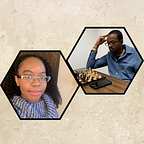(Short Essay) The limits and advantages of using chess logic in daily life
Chess has a sort of built in, if then logic.
“If he plays e4, then I’ll play e5” and on and on…
The on and on problem, is where chess logic quickly begins to unravel. For some, the belief that logic can solve all problems is a comfortable space to rest in.
A stubborn belief system only countered by the asymmetrical attitude of irrationality imposed upon by life.
This is especially true of interpersonal relationships. Where emotions, much like an earthquake, push past the seismic limits set forth by bridge engineers. Shocking the structure before careening it into the ocean.
Navigating the waters of one’s relationship, or relationships with others using a basis of combative positioning, and tactical assessments against an opponent. Will no doubt result in acute failure in these domains. Meaning that chess logic is strictly limited to the strategic evaluation of moving objects, or events that can be predicted with a degree of certainty based on the past successes and failures of an individual or entity.
Otherwise, I have to admit that chess logic is virtually bullet proof.
For it trains into you more than anything, the ability to evaluate risk. Enabling a person to foresee the impact of theirs and other peoples decision making over time. Gaining this understanding derives from a combination of calculation and intuition forged over the hellscape of the board. The first and final frontier of battle in the royal game.
For example, it’s easy to say, “I’ll go to McDonalds today, it’s just one time.”
This is no big deal, however, what my mind does is begin to count. For when I decide to go to McDonalds the next week, and the next week, I build a sort of spreadsheet within my mind that determines whether or not this is becoming a habit. After the 5th week of doing this, a sort of alarm goes off in my head that says, “if you keep going to McDonalds, what will you look like in 5 years?” At that point, I’ll train myself off the restaurant because I can see the trajectory.
This thought process was trained into me because of chess. Over the board it’ll go something like, “if I continue to push the h-pawn, it’ll eventually cramp my opponents position, and perhaps eventually break the pawns in front of his king. Leading to an advantage over the long-term.” Vice versa, my opponent might think, “he launched his h-pawn, meaning that I should accelerate my attack on the queenside, start my own kingside attack, or perhaps reinforce my position by moving my second knight over alongside my other heavy pieces to erect a barrier and blunt his attack, before returning the favor.”
The clarity of these thought processes also leads to dynamic action in life. For scattered and fractured thinking has no place in chess. As your army will quickly shatter, should they arrive over the board.
Another real life example of this type of reasoning occurs something like this. “I’m riding through a green light on my motorcycle. Across the street is a police car siting in the parking lot. Since the windows are tinted, I cannot tell if an officer is in there or not. If there is, l’ve been profiled because I’m on a very fast vehicle. My exhaust can be heard approximately 2 miles away at 15000 rpm, meaning that since I’m merging onto the highway, I cannot spin my engine past 6000 rpm in any single gear less he hears me, and tries to hit me with a noise ordinance, or expedition of speed.”
When I was traveling to New York, it went something like, “The GPS is telling me to walk down this alleyway towards my destination. I have a headphone in my ear for it to give me the directions. I don’t hold my phone as to not look like a tourist which could make me a possible target. The problem is that all of the other streets are packed full of people, while not a soul is traveling down this route. ‘I know that New York has an extremely high crime rate. I know that muggings are common place, and that obscuring myself within crowds is safer.’ I decide against walking down the shortcut offered by the GPS.”
In chess, both these types of thinking are known as prophylaxis. One of the strongest players ever to play the game was known as, “Tigran Petrosian.” Nicknamed, “the iron tiger,” for his almost impenetrable style play which emphasized king safety above all else.
During his games, he would construct fortresses out of his pieces. Blunting enemy attacks, and frustrating his opponents into submission as their cacophony of brilliant tactical motifs, shattered against the tempered steel of his abrasive armor.
This is not to say that building fortresses and hiding from life’s woes is the best course of action, because in many instances it most definitely is not. For example, my sister and I took a massive risk separating from the military during covid to go college. During this time, we tried our damnest to keep our grades solid in order to transfer to other schools. Leveraging our books in our applications, she succeeded in going to Princeton, while I shattered on the rocks, and sank into the sea. I know very well where I might have miscalculated, however, the risk was taken, and the gambit failed spectacularly on my end.
If you take anything away from this article. Remember that chess is an incredible tool for solving IQ problems, not for weighting EQ questions.
~ Jason Hoskins
Co-Author of 27 books — D.J. Hoskins | Primary Author of 5 Chess Books
If you enjoyed this essay, check out: Of Solemnity (A Collection of Short Essays, Vol 1
Buy Now: https://www.amazon.com/dp/B09W4FM73T
